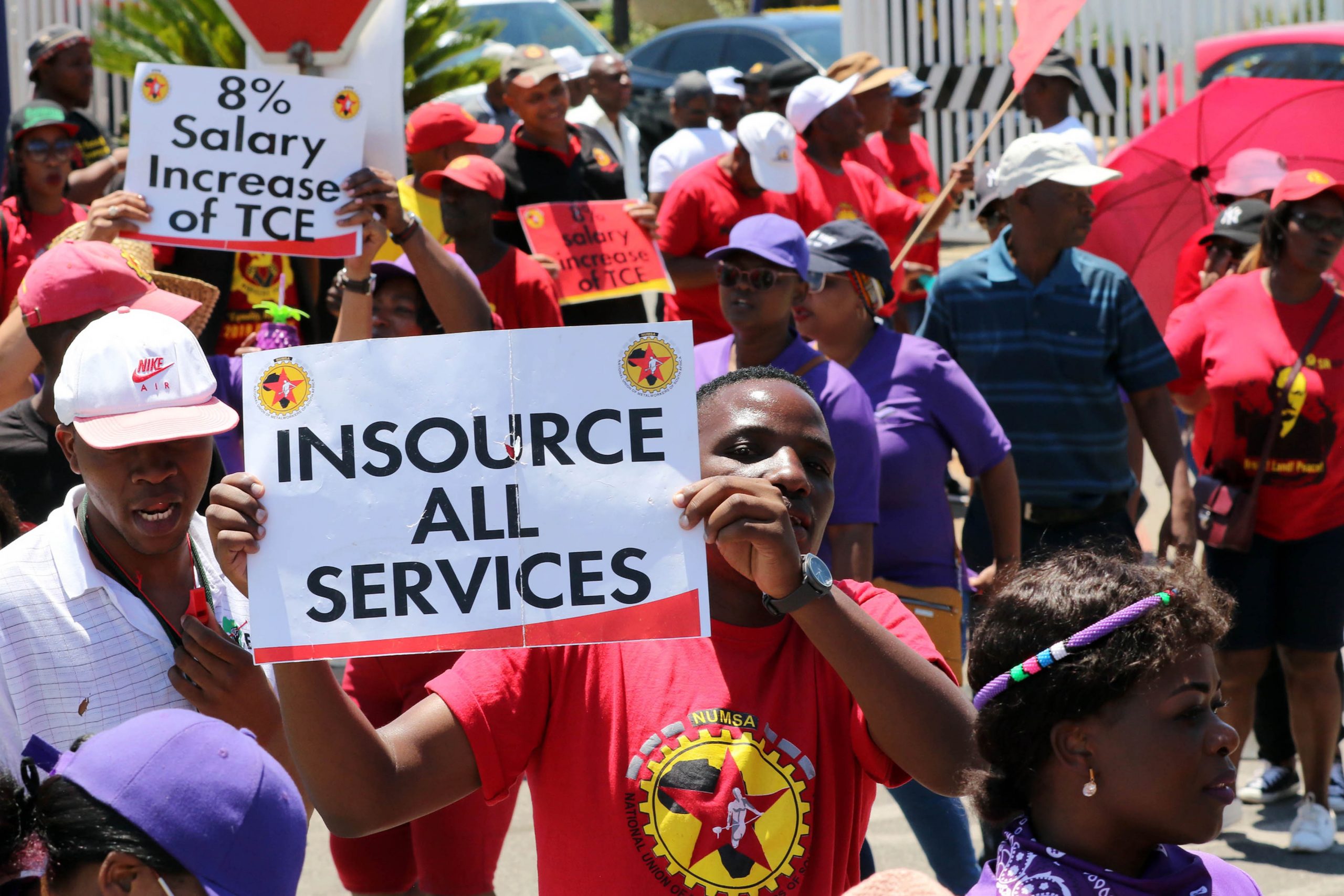SAA, more than just a salary protest
Workers at the state-owned airline have downed tools in an attempt to force SAA to dissolve the board and replace its senior executives to save the company from collapse or privatisation.
Author:
21 November 2019

The National Union of Metalworkers of South Africa (Numsa) and the South African Cabin Crew Association (Sacca) are intensifying their protest against state-owned South African Airways (SAA). They are demanding that SAA increase their salaries, insource services, root out corruption and dissolve the “corrupt board and senior executive managers”.
The unions have met repeatedly with SAA’s top management to try and resolve the no work, no pay protest, which started on Friday 15 November. But their attempts have not yielded positive results.
“It’s clear to us that the management of SAA is not prepared to do what is necessary to save the airline and end corruption. One of our key mandates is to insource all services … to resolve the airline’s cash flow problems. SAA management refuses to accept this demand, which confirms that they’re dishonest when they claim that they want to save SAA,” said Numsa spokesperson Phakamile Hlubi-Majola.
Minister of Public Enterprises Pravin Gordhan said the government won’t be involved in these negotiations as there is no money to meet the workers’ demands. Now, the unions plan to shut down the aviation sector. “This is a fight for survival for all workers in aviation. We are fighting against retrenchments, corruption and privatisation,” said Hlubi-Majola.
History of looting
SAA has a long history of wasting money. The airline was for sale in 1999. But with R4 billion in debt, the government eventually sold only 20% of the company to Swissair and then bought these shares back when Switzerland’s national airline collapsed.
American banker Coleman Andrews was brought in to turn the airline around, but only stayed for two years of his contract. He sold 21 of SAA’s aircraft, leaving the airline to lease aeroplanes at a higher cost. He was paid R244 million.
Overseas consultants McKinsey & Company and Bain & Company pocketed more than R220 million in 2000 and 2001, with additional managers hired from overseas costing another R330 million. Andrews, who brought in the consultants, had previously been the chief executive of Bain & Company.
Related article:
From 2004, chief executive Khaya Ngqula wasted more money. He was paid R20 million in wages, performance bonuses and retention payments between 2004 and 2009, according to information that then public enterprises minister Alec Erwin submitted to Parliament.
Ngqula was fired in 2009 after he spent R141 million on sport sponsorships despite only having R3 million for this in the budget, awarded a tender to his wife’s business partner and spent R3.3 million hiring corporate boxes at stadiums to watch sports events. His termination payout amounted to R9.35 million.
By March 2008, SAA had debt amounting to R17.7 billion and the R744 million it “saved” by retrenching workers did not make a dent.
There were several different chief executives at SAA between 2012 and 2015, with one staying for just four months.
Dudu Myeni became chair of the SAA board in 2012 and was axed in 2017 over numerous alleged irregularities. These included her involvement in appointing BnP Capital as a financial adviser, despite the company not having a licence, and attempting to cancel a partnership deal between SAA and Emirates that the board had approved, as former president Jacob Zuma was allegedly against the deal.
Unnecessary spending
Numsa and Sacca say there are savings to be made by ending corruption and halting outsourcing. According to the unions, a 2015 forensic report from accounting firm Ernst & Young found that ground handling done by Swissport costs 150% more than the service provided locally. An R85 million tender was given unnecessarily to a German company to do catering. Poor procurement controls meant 60% of contracts analysed by Ernst & Young in 2015 were “improperly negotiated, poorly contracted or weakly managed”. But during this time, SAA retrenched workers – again, to save money. SAA spends R25 billion a year on procurement and the unions say this is a key area for corruption and wasting money.
Between 2013 and 2016, the government spent R121 million on investigations into financial irregularities and alleged corruption at SAA. Currently, Mumbai-based Tata Consultancy Services is responsible for “revenue management”, which could be done by in-house accountants. Accenture Consulting is charging R30 million to do a human resources project for SAA.
Over the years, SAA has slashed its workforce of 11 000 people down to 5 149. Regional partner airline SA Express Airways retrenched another 124 workers in September. Plans to retrench a further 20% of the remaining cabin attendants would signal a potential safety risk to passengers.
A better life for our children
Baggage loading, security, cleaning, flight meals and call centres have been outsourced to private companies even though they could be performed by SAA employees at a lower cost.
Qhamla Zamantungwa* is a father of three who works as a cleaner at SAA’s offices in Kempton Park, Ekurhuleni, in the employ of cleaning firm Morena Corporate Services. He earns R3 500 a month, which he says isn’t enough, while in-house SAA cleaners earn far more.
A quarter of his salary is spent on transport. Zamantungwa says he is unable to keep up with his household responsibilities. “We are deeply indebted. When I earn, I pay bomashonisa and soon afterwards I borrow more money again,” he says. His firstborn daughter is in matric, but may not be able to study further as he cannot afford the fees.
“Even our salaries are an insult. If they could insource us, we will be able to ensure a better life for our children,” he says. “Let’s pray that Numsa and Sacca win this battle … My wish is to have a better life and to see my children’s future blossoming. Or else they will struggle like me.”
Zamantungwa’s wish is shared by many of the low-paid workers who are contracted by labour brokers.
Tough labour conditions
Zama Ndaba* has been a security guard for Reshebile Aviation and Protection Services (Raps) since 2006. It is one of the most expensive security labour brokers for SAA.
It is 5.45pm on the day New Frame is there and Ndaba has finished work at the SAA offices in Kempton Park. We are giving her a lift and stop to pick up two of her fellow security guards when Ndaba notices them walking to catch either a taxi or a train.
En route, they air their complaints and dissatisfaction about labour issues among themselves. Ndaba says she’s supposed to be off duty but needs to continue working to maximise her November income.
Related article:
One of her colleagues weighs in about feeling fatigued. “Ai, this is difficult. My body really does not want to work, but what can I do? My children need to eat.”
The other joins in, on the topic of uniforms. She’s wearing a shirt that is too big for her because she does not have the correct uniform. Her colleague says, “Yours is better. I am wearing a shirt that has holes.” She adds that one of her relatives asked how she could wear something like that. “I wear whatever I have, as long as it’s black and white like our uniform,” she replied.
What’s news at work is the protest. “We are so excited for the protest. We also want to be absorbed by SAA, because right now we are underpaid and exploited. We are even falling ill and might suffer from terminal diseases because we are always in the cold as security officers,” says the one guard.
Forty minutes later, we are almost at our destination in Tembisa and the conversation dissipates.
Insufficient salaries
Now, seated in Ndaba’s rented room, she says: “My body is always tired, yoh! Every time when I arrive here from work, I have to cook, help my daughter with school homework and do other house chores.”
All her colleagues complain about insufficient salaries. Ndaba earns R4 500 per month. “I pay R900 for renting my place, R1 000 for groceries, R500 giving to my second-born daughter, who’s currently studying at university, another R500 is for burial societies, and I still need to buy a R160 monthly train ticket,” she explains.
Ndaba and her colleagues are unhappy that Raps makes provident fund and tax deductions from their salaries, the latter of which Raps allegedly fails to pay over to the South African Revenue Service, leaving workers owing the tax office.
Ndaba says that Raps sometimes refuses to pay them on time, saying SAA hasn’t paid them. This results in Ndaba and her colleagues’ debit orders and loan repayments incurring late payment fees.
Fezokuhle Nkosi*, another Raps security guard who works at the SAA offices, says she didn’t receive her bonus in December last year as expected. It was only paid between February and March this year, forcing her to borrow money from the bank to pay for a preplanned traditional ceremony that she had delayed to December, planned to pay for it with her bonus.
Debt yoke
“Right now, we are heavily indebted. But if we could be absorbed, we could reduce these debts,” says Ndaba.
When asked what she would do if Numsa and Sacca succeed in getting them employed in-house, she says, “Yoh! Yoh! First thing will buy a house so that my children will be safe. If I go to emakhaya, my children will rent until when?”
SAA has been cancelling some of its local and international flights since the protest kicked off on 15 November. The airline said it loses about R52 million a day and has lost more than R300 million since the protest started.
The workers are asking themselves why SAA has opted to cancel flights when it has already lost more by doing so than it would cost to increase their salaries.
They’re convinced that the board and executive managers are deceitful when seeking bailouts.
Sacca president Zazi Nsibanyoni-Mugambi, who has been a cabin crew member since 1999, says they have witnessed corruption taking place at SAA for too long. “SAA, from the shareholders to the board, have not been interested to deal with corruption,” she said.
Workers must remain resilient
Numsa and Sacca say it is of paramount importance that the workers remain resilient to save SAA’s future and their jobs.
Nsibanyoni-Mugambi wanted to know why, if there is no money, SAA increased pilots’ salaries and meal allowances and yet, when more workers demand the same, they are told there’s no money, even though their individual salary increases combined would be far less than what the company pays pilots.
The unions say the end goal for SAA’s board and executive managers is to run the company into insolvency so that new, private-sector owners take over.
“SAA Group provides a number of services to various airlines. Some of these services include technical and maintenance support, airline catering, cargo and other related services. If the airline is privatised, then it means all workers in these companies will be affected in one way or the other,” Hlubi-Majola said.
Additional reporting by Anna Majavu
*Names have been changed to protect our sources from possible victimisation.


